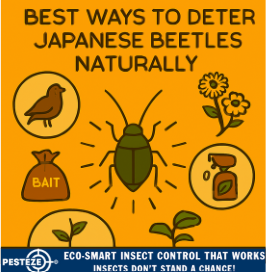BEST WAYS TO DETER JAPANESE BEETLES NATURALLY

BEST WAYS TO DETER JAPANESE BEETLES NATURALLY
SUMMARY
Japanese beetles are one of the most destructive garden pests, feeding on roses, fruit trees, vegetables, and ornamental plants. Their swarming behavior can cause severe plant damage if left unchecked. Fortunately, with natural deterrents, proper garden care, and predator support, you can control Japanese beetles and protect your plants effectively.
FEATURES
-
Handpick Beetles – Collect beetles in the morning and drop them into soapy water.
-
Use Row Covers – Shield plants with lightweight covers during peak beetle season.
-
Companion Planting – Garlic, tansy, and catnip repel Japanese beetles naturally.
-
Apply Neem Oil – Disrupts beetle feeding and reproduction safely.
-
Introduce Natural Predators – Birds and beneficial insects help reduce beetle numbers.
-
Maintain Healthy Plants – Strong, well-nourished plants resist beetle damage better.
GUIDE DESCRIPTION
Japanese beetles are invasive pests known for feeding on more than 300 plant species, often skeletonizing leaves and damaging flowers, fruits, and crops. Once they emerge in summer, they can quickly overwhelm gardens, making prevention and control essential.
One of the most effective natural strategies is handpicking beetles. Early in the morning, when they are sluggish, shake them off plants into a bucket of soapy water to reduce their numbers.
Row covers are another reliable defense. Lightweight and breathable, they block beetles from reaching plants while still allowing sunlight, air, and rain to pass through. These are especially useful for vegetables and young plants.
Companion planting provides a natural deterrent. Garlic, tansy, catnip, and chives release scents that repel Japanese beetles. Planting them around susceptible crops or ornamental plants creates a protective barrier.
Neem oil is a safe, eco-friendly option for treating infestations. When sprayed on leaves, it disrupts the beetles’ feeding habits and prevents larvae from maturing, reducing populations over time. Reapply after rainfall for consistent results.
Encouraging natural predators can also help keep populations under control. Birds such as starlings and cardinals, as well as beneficial insects like tachinid flies and parasitic wasps, feed on Japanese beetles or their larvae. Creating a bird- and insect-friendly garden supports these natural allies.
Finally, maintaining healthy, resilient plants makes them less vulnerable to beetle damage. Regular watering, mulching, and soil enrichment with compost strengthen plants, allowing them to recover more quickly from pest activity.
By combining handpicking, row covers, companion planting, neem oil treatments, predator support, and plant care, you can significantly reduce Japanese beetle damage. These eco-friendly methods offer a safe, sustainable way to protect your garden from these invasive pests.
- Shashank Rongali


Comments 0